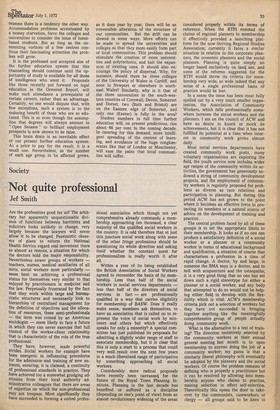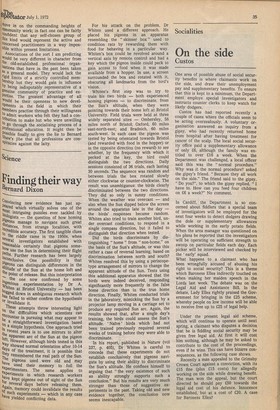Society
Not quite professional
Jef Smith
Are the professions good for us? The arbitrary but apparently unquestionable division of functions between barristers and solicitors looks unlikely to change, very largely because the lawyers will never allow it to be changed. Pessimistic obserers of plans to reform the National Health Service regard real movement there as almost as remote, a situation for which the doctors hold the major responsibility. Nevertheless newer groups of workers — teachers, nurses, medical auxiliaries of all sorts, social workers most particularly — seem bent on achieving a professional status for themselves very similar to that enjoyed by practitioners in medicine and the law. Perpetually frustrated by the fact that they work within large and bureaucratic structures and necessarily look to hierarchies of centralised management for the definition of objectives and the allocation of resources, these semi-professionals — the term was coined by an American sociologist — seem likely to face a future in which they can never exercise that full control of the worker-client relationship that is t haracteristic of the role of the true professional.
They have, however, made powerful strides. Social workers for example have been energetic in influencing procedures for the admission and training of new entrants, ensuring, it is claimed, a continuity of professional standards in practice. They have achieved too a somewhat grudging admission from their local authority administrative colleagues that there are areas Of expertise on which the non-professional may not trespass. Most significantly they have succeeded in forming a united profes sional association which though not yet comprehensive already commands a mem bership approaching ten thousand, a clear majority of the qualified social workers in the country. It is odd therefore that at just this juncture social work along with some of the other fringe professions should be questioning its whole direction and asking itself whether the constant quest for professionalism is really worth it after all.
Within a year of its being established the British Association of Social Workers agreed to reconsider the basis of its membership. Less than half of the social workers in social services departments — less than half of the directors of social services in fact — are professionally qualified in a way that carries eligibility for membership of BASW. Does it really make sense, members ask themselves, to have an association that is called on to represent the voice of social work by ministers and others but which effectively speaks for only a minority? A special committee has just published its proposals for admitting a slightly wider range of staff to associate membership, but it is clear that this is only a start to a process that could very well result over the next few years in a much liberalised range of participation by something approaching all social workers.
Considerably more radical proposals have recently been canvassed for the future of the Royal Town Planning Institute. Planning in the last decade has benefited or suffered as a discipline (depending on one's point of view) from an almost revolutionary widening of the areas considered properly within its terms of reference. When the RTPI resisted the claims of regional planners to membership it effectively provided a launching platform for the now thriving Regional Studies Association; currently it faces a similar situation in relation to the corporate planners, the economic planners and the social planners. Planning is quite simply no longer based exclusively on land use, and some of the reforms suggested for the RTPI would throw its criteria for membership very wide, so wide indeed that any sense of a single professional basis of practice would be lost.
In a sense the issue has been most fully spelled out by a very much smaller organisation, the Association of Community Workers, which falls professionally somewhere between the social workers and the planners. I am on the council of ACW and have no desire to knock or mock its achievements, but it is clear that it has not fulfilled its potential at a time when interest in community work grows almost daily.
Most social services departments have created community work posts, many voluntary organisations are exploring the field, the youth service now includes wider age ranges of the community within its activities, the government has generously endowed a string of community development projects, and the employment of community workers is regularly proposed for problems as diverse as race relations and participation in planning. But during this period ACW has not grown to the point where it becomes an effective force in protecting its members or a natural source of advice on the development of training and practice.
The central problem faced by all of these groups is to set the appropriate limits to their membership. It looks as if no one can produce a satisfactory definition of a social worker or a planner or a community worker in terms of educational background and qualification, a situation of course that characterises a profession in a time of rapid change. A doctor, by and large, is someone the BMA says is a doctor, and to hell with acupuncture and the osteopaths; it is a very good thing that no one has set down such a rigid stereotype for either a planner or a social worker, and any body that attempted to do so would not be helping either field to develop with the flexibility which is vital. ACW's membership criteria pick out a selection of workers but they have not succeeded in bringing together anything like the meaningfully comprehensive group of people actually doing community work. What is the alternative to a test of training? The direction tentatively selected by the community workers at their annual general meeting last month is to open membership to anyone doing the job of a community worker; my guess is that a similarly liberal philosophy will eventually be adopted by the planners and the social workers. Of course the problem remains of defining who is properly a practitioner but it can be resolved by allowing into membership anyone who claims to practise, making selection in effect self-selection. Theoretically this opens the door to takeover by the communists, caseworkers or clergy — all groups said to be keen to inove in on the commanding heights of community work; in fact one can be fairly confident that any self-chosen group of this kind would represent the active and concerned practitioners in a way impossible within present limitations. Associations of the sort I am predicting Would be very different in character from the old-established professional organisations that have in the past been taken as a general model. They would lack the ntlgid limits of a strictly controlled memoership but they would gain in influence bY being indisputably representative of a genuine community of practice and exPeruse. The greatest advantage of all would be their openness to new develoPments in the field in which their nlernbers practise through their willingness to admit workers who felt they had a contribution to make but who were unwilling tO go through the socialising process of a Professional education. It might then be Possible finally to give the lie to Bernard Shaw's jibe that all professions are conspiracies against the laity.























































 Previous page
Previous page